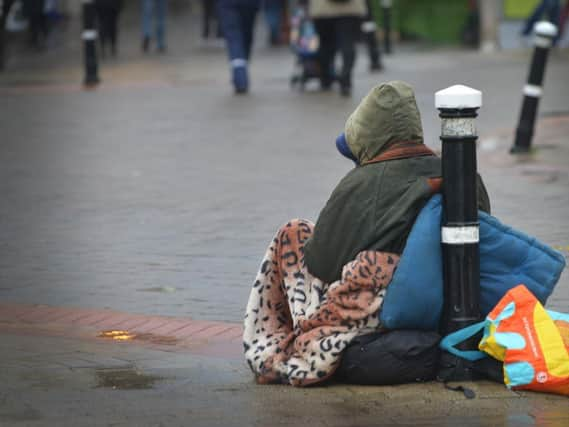'We need a long term solution for homelessness in Northamptonshire'


At the height of the Covid-19 pandemic this year we saw rough sleeping vastly reduced through government measures to house the homeless in temporary accommodation.
The initiative was supported locally by the ongoing dedication of community groups and charities, including Northampton Hope Centre, Sikh Community Centre and Youth Club, Wellingborough Homeless Forum and Accommodation Concern (to name a few great local organisations) to keep street sleepers safe and well during a public health crisis and provide wellbeing support, resources and food aid.
Advertisement
Hide AdAdvertisement
Hide AdAs a result of the government’s ‘Everyone In’ scheme, thousands of the most vulnerable people were provided with a temporary roof over their heads, some moving on to living in supported accommodation and hundreds of deaths on our streets up and down the country were prevented. We saw that with the political will and the requisite funds we can solve this crisis.
However, a short-term policy will not go the distance in eradicating homelessness, no matter its temporary achievements. It needs to be longer term. That is why homelessness charities called for a return of the initiative during the second recent lockdown. A repetition of the scheme would have perhaps indicated that the government was committed to its manifesto pledge to end rough sleeping once and for all within five years of taking office. That remains to be seen.
Winter is coming and temperatures have started to drop. Severe Weather Emergency Protocol (SWEP) is yet to be activated across Northamptonshire. Local homelessness charities are currently lobbying for SWEP to be put into action so that vulnerable folk on our streets can be protected from severe cold weather.
The ‘Everyone In’ policy had the potential to develop into a more progressive set of actions such as the successful ‘Housing First’ programme, which was introduced in Finland in 2007. It combines prioritising housing with ongoing support services and takes away the barriers to achieving the security of a home. The long term dedicated policy has seen a vast reduction in and the prevention of homelessness. But more importantly as Aneurin Bevan, the once health and housing minister, rightfully pointed out, housing and public health are both inextricably linked and you can’t improve one without the other.
Advertisement
Hide AdAdvertisement
Hide AdThe other urgent key issue that needs to be addressed is affordable social housing and sufficient stock. The ideal of right to buy to create a nation of property owners way back in the 1980s was a very short-sighted policy under the Thatcher administration for it never delivered the personal freedom and aspirational values it promised for many; instead it resulted mainly in council housing stock being sold off to private landlords and many working people being priced out of the housing market.
We have a serious deficit in social housing stock as a result and a large number of people on low incomes living in private and social housing that is not regulated to decent standards. There are a lot of very good landlords out there, but there are also a lot of appalling ones. You only need look at the awful and criminal Grenfell Tower tragedy to understand the moral and serious ramifications of poorly regulated housing. That is why a new Government White Paper introduced in the wake of the Grenfell Tower tragedy to reform social housing has been largely welcomed. However, there needs to be a safety net for people living in privately rented housing too.
A number of renters unions have sprung up across the UK in order to fill the gap that government is not supporting with appropriate legislation. Generation Rent, an organisation supporting private renters to make houses safe, secure and affordable is specifically campaigning against Section 21, which allows landlords to evict a tenant once a fixed term contract has ended without any good reason. Landlords using Section 21 to evict their tenants only need to give two months notice.
The impact of insecure housing and homelessness cannot be underestimated. In the words of the writer Matthew Desmond: “Decent, affordable housing should be a basic right for everybody in this country. The reason is simple: without stable shelter, everything else falls apart.”